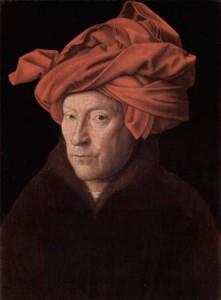 The question about the subject, as well as the various strategies of becoming a subject, both in art history (‘Kunstwissenschaft’) and philosophy, has significantly shaped the discourses of both disciplines since the Second World War. In philosophy, especially under the influence of Foucault, the focus has primarily been placed on the procedural and at the same time socially-connoted dimension of subjectivization. In art history, a tendency to reinforce the ‘effect’ of the object, i.e. its active force as an agent, or even of subjectivizing it, has been observed in more recent years.
The question about the subject, as well as the various strategies of becoming a subject, both in art history (‘Kunstwissenschaft’) and philosophy, has significantly shaped the discourses of both disciplines since the Second World War. In philosophy, especially under the influence of Foucault, the focus has primarily been placed on the procedural and at the same time socially-connoted dimension of subjectivization. In art history, a tendency to reinforce the ‘effect’ of the object, i.e. its active force as an agent, or even of subjectivizing it, has been observed in more recent years.
The starting point for the philosophical approach was especially the critique of the metaphysical and political implications of an inherently Western philosophy of the subject – a hypostatized subject, which cannot be found in this form in non-Western cultures. In art and literature, on the other hand, the theme of subjectivity has largely taken the form of a targeted definition of the problem of the power of the authorial subject. This dimension of power, but also of the powerlessness of the glance, always combines in an ambivalent way the subject that sees and the subject exposed to being seen. It touches on fundamental aspects of an ethic of perception, which have only been tackled in research in a marginal way, if at all.
For instance, in visual culture and film studies the focus has mainly been placed on the analysis of the so-called ‘scopic regime’ and on the power of the gaze. Less reflection has been devoted, by contrast, to the subtle, and not always perceptible, transitions between visibility and invisibility, between seeing and being seen, though these are indispensable, in order to be able to reflect on the relation between alterity and visuality. In studies on the portrait, on the other hand, reflection has primarily been focused on two aspects: either on the various modalities of the visual representations of the subject and of its subjectivization; or on voyeuristic strategies, and, as a corollary to this, the ‘objectification’ of the subject. Starting out from cultural-anthropological reflections, one significant development can however be observed in more recent years: namely, that the object itself has become not only the focal point but has itself become an agent (agency theories). The question is consequently posed: what role should be attributed to the recipient in this connection? Does the possibility not exist of the latter being turned into a purely passive perceiver? And is not therefore the recipient’s viewpoint always a pretence? What about the recipient’s power of imagination?
The aim of the interdisciplinary workshop at the KHI is to critically analyze these complex strategies and paradoxes of the process of becoming either the subject or the object from a perspective of the ‘longue durée’. The many-sided implications and connections that result from such an analysis will enable us ‘inter alia’ both to pose the following questions and to define the following still-problematic fields for discussion:
How does the subject assume form – how does it become « Image »?
What visual strategies are used for the subject’s ‘mise en scène’?
How are the power and powerlessness of the gaze, of the ocular contact, put on show?
What role is played in this connection by questions of visibility and invisibility?
What happens in processes of metamorphosis, in which the boundaries between subject and object are dissolved?
What happens when the « object is transformed into the subject » or vice versa?
Can the grammatical subject be differentiated from the acting subject and, if so, to what extent?
How is the subject transformed into the author?
What are the features that make the subject individual: the face, the voice?
Contributions from the fields of art history, philosophy, film studies, literary studies and other related disciplines are welcome. Lectures proposed for the workshop should not exceed a spoken length of 25 minutes.
Please send your proposals (max. 1800 characters) and CV in German, English, French or Italian no later than 15 May 2016 to both the following email addresses: maria-teresa.costa@khi.fi.it ; gruendler@khi.fi.it.
Subject and subjectivization in art (history) and philosophy. A definition of the problem
Workshop at the Kunsthistorisches Institut in Florenz – Max-Planck-Institut,
2-3 December 2016

Leave a Reply
You must be logged in to post a comment.